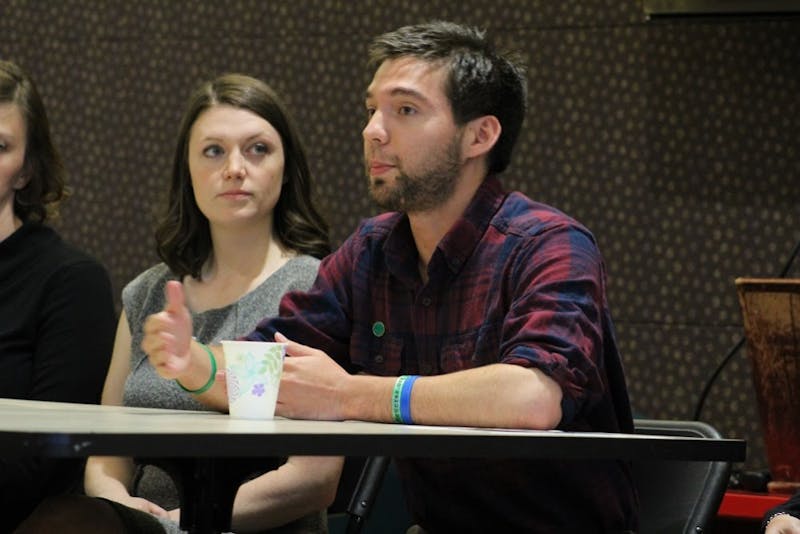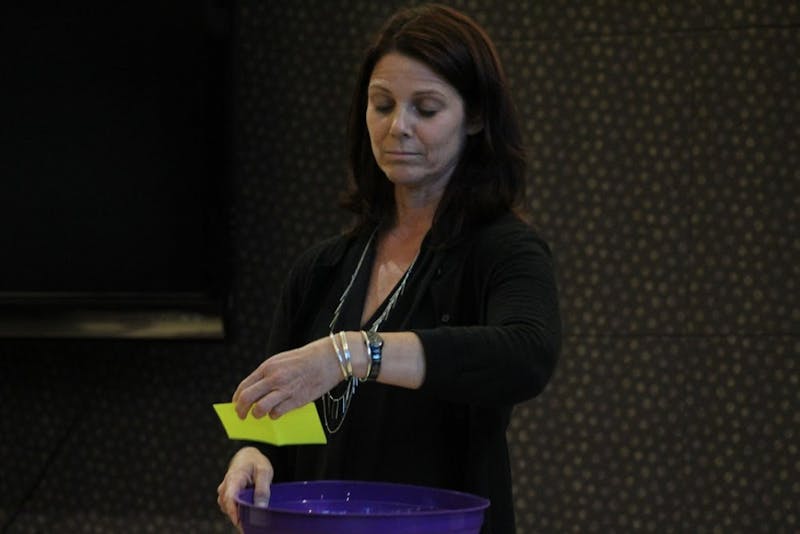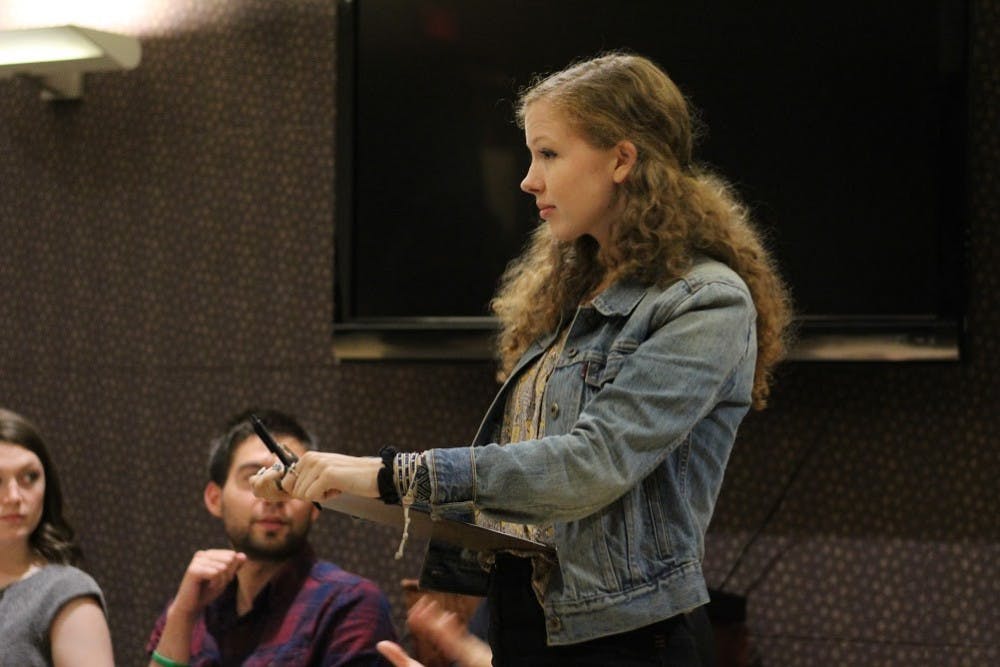Around 50 students and University of Portland community members gathered in a sectioned-off corner of Mehling Ballroom Tuesday evening to discuss the national epidemic of sexual assaults on college campuses and its implications on The Bluff.
After a brief introduction, organizers screened the documentary The Hunting Ground, which highlights this problem, showcasing stories of sexual assault survivors from colleges across the country including UP’s sister school, Notre Dame. Most of these students were silenced or ignored by their universities.
The event was organized by Health and Counseling Center Director Margaret Trout and Outreach Coordinator Tiger Simpson, in coordination with the center’s Student Health Advisory Board and the Students Against Sexual Assault (SASA) club.
During the break between the film and the panel, nearly half of those in attendance left, including Title IX coordinator Lauretta Frederking, who gave a brief introduction to her position prior to the screening but was scheduled to be at another on-campus event during the panel. Alex Hermanny, associate director for community standards and head of the student conduct process, was also not in attendance, though the panel leaders introduced Morgan Hanson, hall director for Mehling, in his place.
Those who stayed listened to panelists — including Trout, Simpson, Hanson, two other Health Center counselors and a representative from off-campus resource Call to Safety — as they answered anonymous questions mainly concerned with how victims of sexual assault are supported, how a survivor can go about reporting their experience, addressing fears related to reporting, and UP’s transparency when it comes to sexual assaults reported on campus.

Students in attendance submitted questions asking how forthcoming UP is about the number of sexual assaults reported on campus and the process that is taken after a report.
Panelists asserted that the University does its best to be transparent, but also agreed that there is room for improvement.
“There was a question: ‘Is UP covering stuff up?’” said SASA co-founder Katie Reinig. “That’s not an accusation at all, it’s just that we always want to be striving to be better and I think that to be better in this respect we need to be very transparent, and I think that’s just a problem a lot of college campuses have. Like they said, it’s like running a business too. I think that just striving toward putting students first and the business of the school second is really something that every college campus could benefit from.”
A chief issue in The Hunting Ground is the way sexual assault survivors are treated by their universities after reporting, which was covered heavily by the panel afterwards. Students questioned whether they would be punished for underage alcohol consumption if they were drinking at the time of the incident. Some mentioned that students fear being scolded when coming home to the dorms after a night of drinking, so instead they find places to stay off-campus, potentially putting themselves in dangerous situations.
It is University policy to respond first to sexual assaults and not to punish victims if they had been drinking illegally at the time of their assault.
Hall Director Morgan Hanson reiterated that residence life’s priority is student safety and encouraged students to come home to the dorms, saying that underage drinking would be dealt with on a case-by-case basis.
Additionally, the panel mentioned the difference between confidential and non-confidential reporting parties. Campus ministry, SAFE advocates and all health staff are confidential on-campus resources. Professors and other campus faculty are generally mandated to share any reports of sexual assaults on campus to the Title IX coordinator.
In her introduction, Frederking spoke about the importance of reporting when incidents do happen: “We need people to report incidents and we need everyone to prevent incidents.”
But regardless of attendees’ concerns and confusion surrounding the reporting process, it is clear that students in attendance recognize the problem of sexual assault on UP’s campus.
“This is a national epidemic. It’s plaguing every college campus across this country and to think that we are exempt from it is ignorant,” Abby Sherman, a junior and co-founder of SASA, said after the panel discussion. “We want to make sure this doesn’t get drowned out. We want to be in the forefront of the conversation because we think this is one of the biggest issues we’re facing on campus.”
SASA is a new club founded at the start of the school year, and is the University’s first-ever club dedicated solely to stopping sexual violence on campus. It is part of what seems to be a change of climate on campus in regards to the issue, which also included The Hunting Ground screening and a session at Freshman Orientation dedicated to understanding consent.

Director of the Health and Counseling Center Margaret Trout said that a Take Back the Night rally is being organized for later in the year, to draw greater attention to the problem and reach of sexual assault on campus. Take Back the Night is an international movement to end sexual, relationship and domestic violence. The last rally at UP occurred over eight years ago.
Mental and physical health resources for survivors of sexual assault were also discussed by the panelists.
Fawn Livingston-Gray, a Call to Safety (formerly Portland Women’s Crisis Line) advocate, represented the off-campus resources available to sexual assault survivors. Livingston-Gray spoke about the confidential support resources available at her organization, which include a 24/7 crisis line, a wellness exam, support groups, and medical and legal resources.
Overall, Trout said she was pleased with the turnout at the event and the panel’s discussion.
“I think this is wonderful,” Trout said. “This is just one piece of the whole puzzle that includes the consent education at Orientation that was new, Take Back the Night that will happen next semester and the production (Good Kids) that the theatre will be putting on in a couple weeks. I think that if you look at this as a whole we are right at the beginning of a really powerful time for UP and I’m really excited to be here.”
--
For more information about on- and off-campus resources for survivors of sexual violence or their allies, click here.
Call to safety 24/7 Crisis Line: 888-235-5333, Non-emergency line: 503-234-3749
CORRECTION: An earlier version of this story incorrectly stated that mandatory reporters - professors and student affairs professionals - are required to report any knowledge of incidents of sexual assault to the head of UP's student conduct disciplinary process. In fact, mandatory reporters must share the information with the Title IX coordinator, who conducts confidential investigations separately from the conduct process. The Associate Director of Community Standards would be notified only if the the accuser wanted to pursue sanctions against the accused.








